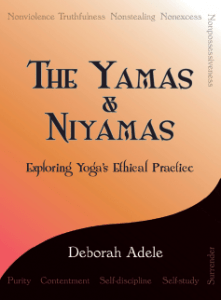
By Deborah Adele
On-Word Bound Books, 192 pages
Understanding the Philosophy of Yoga
“Yoga is a sophisticated philosophy that is designed to bring awareness of your body and thoughts,” says Deborah Adele, the author of The Yamas & Niyamas: Exploring Yoga’s Ethical Practice. A yoga teacher and philosopher, Deborah Adele, has delved into the foundations of yoga in her book, thoughtfully discussing the origins of all the “jewels” of yoga that are capable of bringing purity and perfection in life.
The author divides the fundamental elements of yoga into two parts, Yamas and Niyamas, that encompass the whole gamut of a pure lifestyle guided by non-violence, truthfulness, non-stealing, non-excess and non-possessiveness. In order to achieve these virtues one must imbibe purity, contentment, self-discipline, self-study and surrender. Devoting one chapter to each of these noble virtues, she explains the spiritual meaning of these terms and tells us how to adopt them in daily life. “The Yamas and Niyamas are the foundation for studying our own perception and for boosting our anticipatory confidence as we deal with the challenges and joys of our collective and singular humanity,” she says.
The author replicates the originality of the terms as they are known in Sanskrit. She says, “Ahimsa or non-violence asks us to step lightly, do no harm, and to honor the relationship we have with the earth, with each other, and with ourselves. Following each chapter is a “how to” section, designed to help readers improve their human quality.
It is refreshing to know how yogic philosophy can change our lives for the better. These guidelines will certainly motivate readers to get rid of negative habits and adopt positive values.
By Paul H. Sutherland
Spirituality & Health Books, 193 pages

The Art of Financial Success
If you think managing your income and expenditure is boring and a pain, Paul H. Sutherland has some sensible advice for you. In his book, The Virtue of Wealth: Creating Life Success the Zenvesting Way, Paul suggests that while getting rich is not the right path to finding happiness, managing wealth wisely surely is. He wants readers to discipline themselves when it comes to managing their finances, the way ancient saints managed their lives to bring real joy and happiness. The author aims at helping readers to become lucky investors and take responsibility to make that luck happen. He wants to educate them on choosing the right path to grow their investments, and thus increase the chances of being lucky.
Like a spiritual leader, the author warns that envy, greed and laziness are enemies of individuals and communities. He provides a worksheet to calculate your monthly expenses and future investments. In the process of doing so, the author calls upon you to monitor your desires, thoughts and needs about money while making a budget for expenditure.
Advising those trapped in low income or overspending, he says, “If you are broke you made a bad choice that can be fixed.” Based on the theory that money alone can’t make you happy, Paul provides solutions for every financial problem. “Don’t let time become your enemy. Save early in life. Don’t let a new baby or retirement catch you with a hollow nest.”
He calls the credit card a “Karma Card,” as debt is the result not your karma of overspending. “Karma and debt are related. One can’t blame others for one’s own debt,” Sutherland opines.




